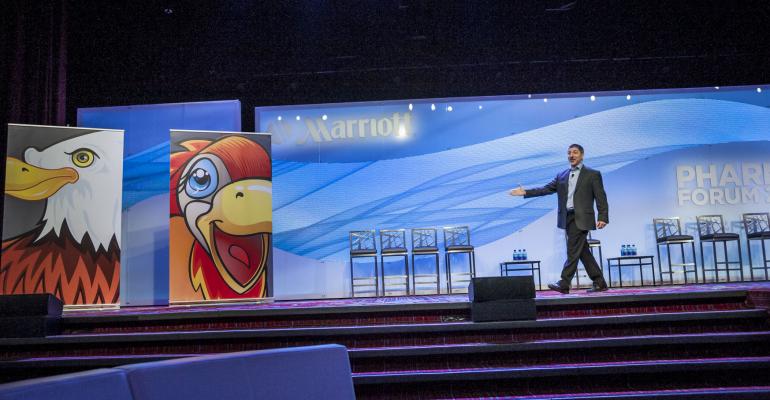 The way author and trainer Merrick Rosenberg looks at the world, the Golden Rule gets turned on its ear. The CEO of Take Flight Learning told the more than 800 meeting professionals at the 2016 Pharma Forum that successful relationships aren’t about “treating people the way you want to be treated,” but rather “treating people the way they want to be treated.”
The way author and trainer Merrick Rosenberg looks at the world, the Golden Rule gets turned on its ear. The CEO of Take Flight Learning told the more than 800 meeting professionals at the 2016 Pharma Forum that successful relationships aren’t about “treating people the way you want to be treated,” but rather “treating people the way they want to be treated.”
But before accusing Rosenberg of heresy, know that his ideas aren’t aimed at moral issues. His goal is to help individuals understand their own communication style, recognize the communication styles of others, and use that knowledge to create better leaders and relationships.
At the Pharma Forum in March, co-produced by MeetingsNet and CBI, Rosenberg took the stage with enormous cardboard cutouts of four birds—an eagle, a parrot, an owl, and a dove. With a big dose of humor and lots of energy, he introduced the audience to the personality styles that each bird represents, adapting the DISC behavior assessment tool, used by psychologists since the 1940s, to group people into four basic temperaments.
Eagle: Dominant, direct, results-oriented, makes quick decisions, bottom-line focused
Parrot: Interactive, optimistic, enthusiastic, group-oriented, energetic, humorous
Owl: Conscientious, process-driven, detail-oriented, logical, questioning, organized
Dove: Supportive, good listener, relationship-oriented, considerate, patient, consistent
So what happens, Rosenberg asked the audience, when, say, an owl does a site inspection with a parrot salesperson? The parrot might be charming and enthusiastic but if he’s short on details, it’s going to be a negative experience for the owl, who wants to come away with all questions answered. These personality clashes, Rosenberg said, spell trouble not just for sales relationships, but for how people want to be delegated to, recognized, and communicated with. (You can discern personality styles just from e-mails, Rosenberg said. Parrots, for example, are big on exclamation marks; doves are sure to start a note asking how you are.)
Most people Rosenberg says have one core style, maybe two, and once you identify the styles of the people you work with, you can adapt to what they’re looking for in the relationship. Do you need to be more direct, empathetic, enthusiastic, or analytical? “The most successful people are the most flexible,” Rosenberg said.
He admits, however, that adapting can be challenging. “If you are selling to someone whose style is different than yours, someone is going to leave exhausted.” With “chameleon selling” as he calls it, “you’re operating outside your factory settings.” But it can be done, Rosenberg said. “Treating people how they want to be treated takes some energy. But you can get good at it.”
Visit the Take Flight Learning Web site to take a mini assessment and discover what kind of bird you are.





